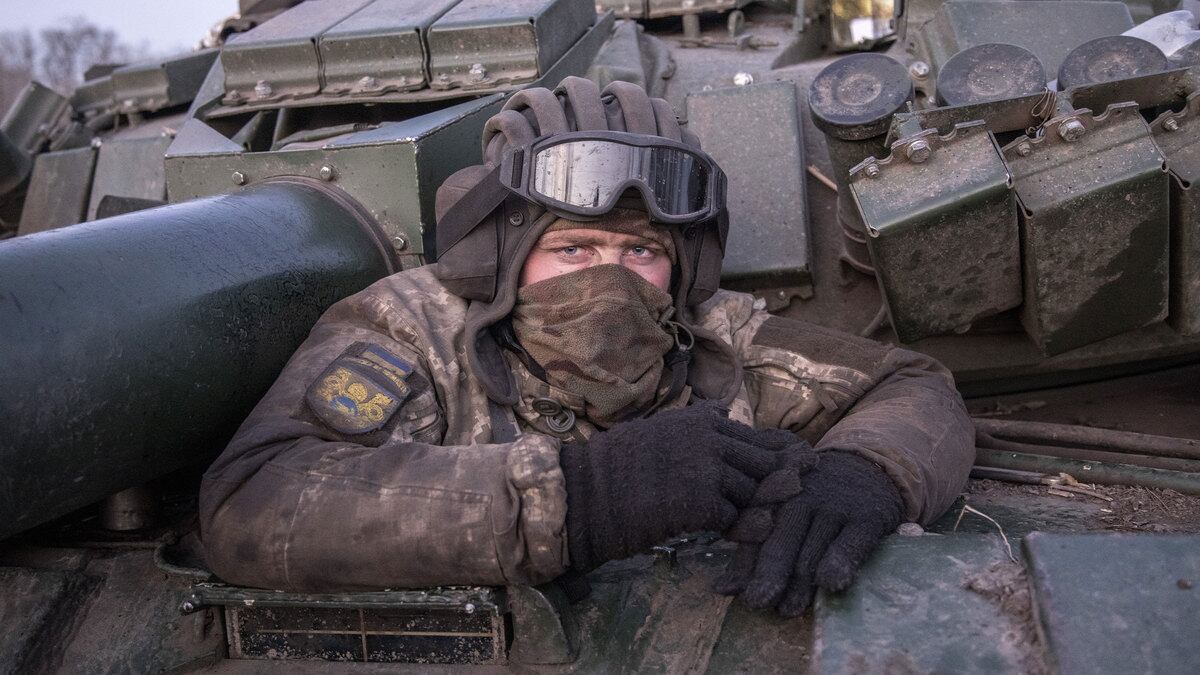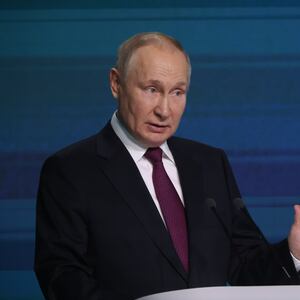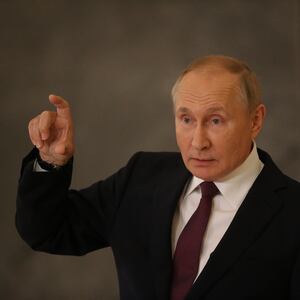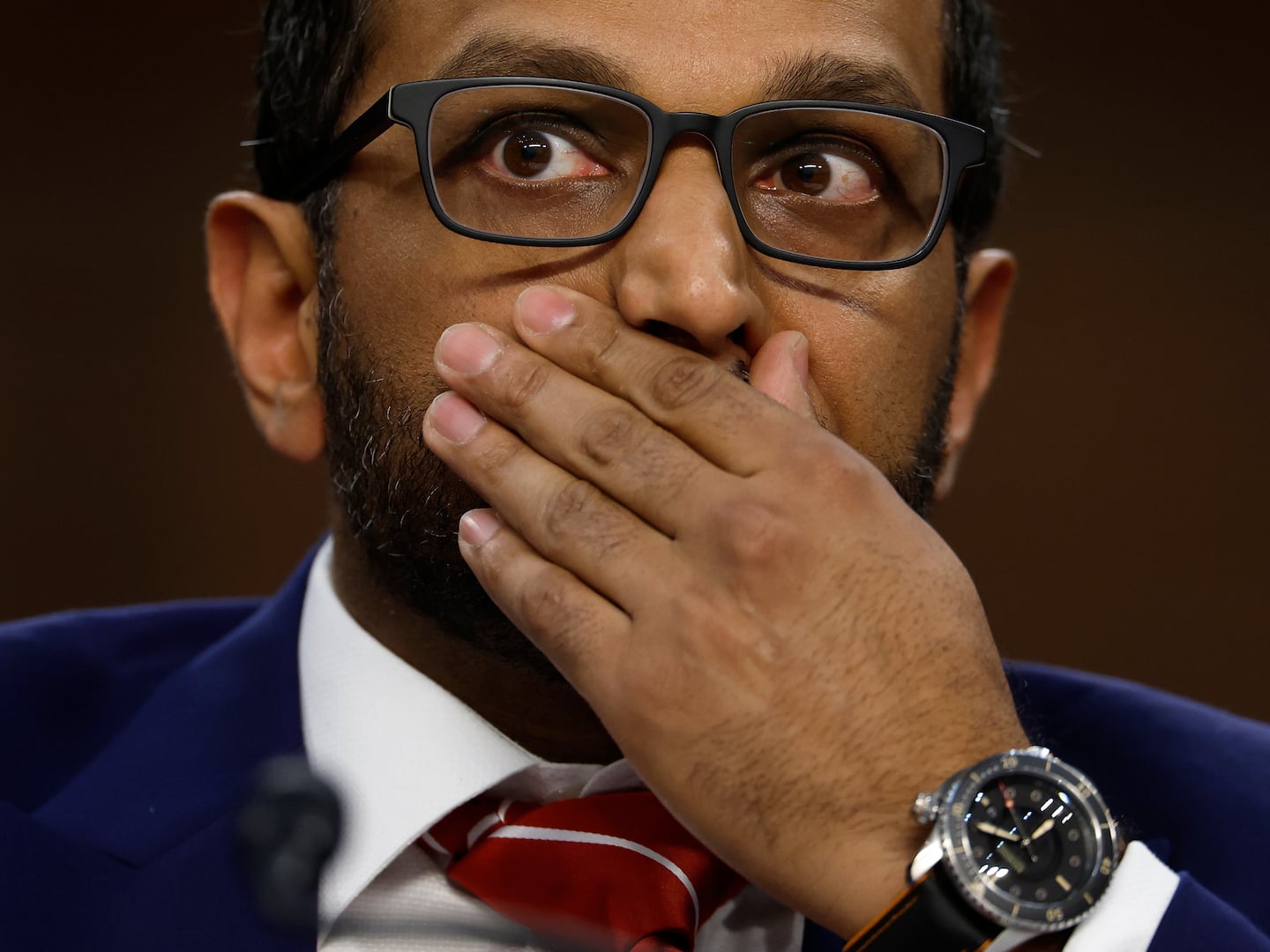Just weeks after Ukrainian forces liberated the city of Kherson in Ukraine and kicked Russian forces out, major questions remain over which counteroffensive campaign Kyiv will launch next—and where Russia’s next defeat will be as the cold winter weather begins to settle in.
Tackling Russian forces in the Zaporizhzhia region could be a logical next step for Ukrainian forces. A win in Zaporizhzhia would help Ukraine cut off Russia’s land bridge to Crimea, the peninsula Vladimir Putin illegally annexed from Ukraine in 2014 and has been occupying ever since. Russia’s hold on Crimea is even more vulnerable now that Kherson—a key foothold just north of Crimea—is back in Ukrainian hands.
In signs they may be anticipating a fight, Russian forces are working on bolstering their defenses near Zaporizhzhia, though analysts say there are no indications of a buildup of troops or equipment near Zaporizhzhia, according to The Washington Post.
Now, the buzz around Zaporizhzhya is fueling other rumors: that Ukraine could be plotting a surprise counteroffensive elsewhere, and might just be working up rumors to fake out the Russians.
Ukraine has leveraged the element of surprise to its advantage before. Earlier this year, a flurry of reports emerged that Ukrainian forces were preparing a counteroffensive against Kherson in the south, when they were actually, behind the scenes, preparing a campaign for Kharkiv in the northeast. That attack forced Russians to retreat in the area, catching them almost entirely off-guard.
Other areas Ukraine might be interested in liberating next could include Enerhodar, where the Zaporizhzhia nuclear power plant is located. Crimea is also on the list of targets in the near future, the top Ukrainian official in charge of Crimea told The Daily Beast. Taking Kherson, just north of Crimea, was a key step Ukrainian forces had to take before considering going after Crimea. Taking back Crimea could happen earlier than this coming spring, the official told The Daily Beast.
In apparent anticipation of a Ukrainian campaign, Russian troops have been working to establish outposts and trenches near the Crimean border and in Donetsk and Luhansk, according to the Associated Press.
Though it’s impossible to predict the next move for certain, Ukrainian forces may very well be working to surprise again, Jim Townsend, the former deputy assistant secretary of defense (DASD) for European and NATO policy, told The Daily Beast.
“They’re very clever people and that’s one of the reasons that they’re doing so well is that they’re unpredictable,” Townsend said, suggesting that the Ukrainians could be leaning on spreading some misinformation to “mislead” the Russians. “Ukraine keeps us guessing. And that's great because it means they’re keeping the Russians guessing too.”

A security person standing in front of the Zaporizhzhia Nuclear Power Plant in Enerhodar (Energodar), Zaporizhzhia Oblast, amid the ongoing Russian military action in Ukraine.
Stringer / AFP via Getty ImagesThere are some indications that the Russians may be leaving Zaporizhzhia already, according to Kyiv. The General Staff of the Armed Forces of Ukraine said last week that some Russian army units are leaving Zaporizhzhia.
But according to the White House, the Russians don’t appear to be preparing for a withdrawal there.
Responding to a question from The Daily Beast on a call last week, John Kirby, a White House National Security Council coordinator, said the Russian movements in Zaporizhzhia may not be indicative of a fuller withdrawal.
“I don’t know that I’d go so far as to say [there’s] some sort of broader withdrawal, at least not at this time,” Kirby said.
Russian authorities have denied they are fleeing the nuclear power plant in Zaporizhzhia as well. Russia earlier this year illegally annexed Zaporizhzhia, and a retreat would be a crushing blow to Putin’s plans to announce territorial control in Ukraine.
Ukraine has gained momentum in the waning months of the year, kicking Russia out of multiple territories it has stolen. But in many ways, the next counteroffensive campaigns may be more difficult for Ukraine than the Kherson and Kharkiv campaigns, in part because Russian forces have been digging in on defense in the Zaporizhzhia and Kherson directions, a spokesman of the General Staff of the Armed Forces of Ukraine, Alexander Stupun, said this week.
Following the defeat in Kherson, Russia is likely scrambling to try to learn from its mistakes, Townsend said.
“Rooting them out of these dug-in positions [and] digging them out with artillery—it’s going to take a lot of ammunition and a lot of effort if they're going to make assaults on dug-in Russians,” Townsend said. “They’re dealing with a Russia that is a bit smarter now than they were. Back in the summer they probably underestimated the Ukrainians and now I think they’re not going to do that. They’re pissed off.”
From an organizational standpoint, Russian forces are not necessarily in the best position to learn from their mistakes, Josh Manning, a former United States European Command Russia analyst, told The Daily Beast.

A view of a destroyed house due to the airstrikes carried out by the Russian Army, as the owner of the house, Volodimir Ziganov (L), tries to save the items that remain intact, in Zaporizhzhia, Ukraine.
Metin Aktas/Anadolu Agency via Getty Images“Their officer corps is decimated. The generals are broken. Everyone’s just playing a blame game right now to avoid taking the ire of the Kremlin,” Manning said. “They’re not learning lessons from this. They’re just not, they’re stuck in what they’re doing.”
But the Russians may have one other key advantage: They can continue to flood the field with manpower.
“Human mass is still on the side of the Russians… They still have the ability to provide more forces than Ukraine does,” Townsend said. “Ukraine can't afford to get sucked into a battle where a lot of their best fighters are killed.”
The Ukrainians might do well to consider a plan that focuses on squeezing in around the Russians from the north and the south and cutting off Russia’s logistical and supplies routes, Manning told The Daily Beast. That plan, rather than working on seizing massive swathes of territory, could result in isolating the Russian forces while they’re already on the defense.
“If you’re the Ukrainians you’re going to try to squeeze them from both sides… from that southern front and from that northern front,” said Manning, who also previously worked at the Defense Intelligence Agency. “And then you’re going to try and rout out those areas of what we call lines of communication… the logistical lines that come in from Russia, and then especially from Crimea... You can do that without really having to take much territory here.”
There might not be many large battles in the near term because the Ukrainians may just play a game of waiting out the Russians after isolating them, Manning said.
“Really, all you have to do is cut the Russians off at this point, and freeze to death,” Manning told The Daily Beast. “Cut them off, isolate them, and then let them just suffer.”
Whatever campaign comes next, it might not be as sweeping or big as Kherson or Kharkiv, Townsend agreed.
“Unlike this summer, this is going to be harder this time around. So we know that whatever they’re going to do, it’s not going to be a cakewalk,” Townsend said.
Ukraine is keeping up the fight in the area, though. Just this weekend the brigade of Ukraine’s Territorial Defense Force responsible for Zaporizhzhia indicated that the Ukrainian forces are pummeling Russian forces and still repelling attacks.
“Mortars of the Zaporizhzhia territorial defense battalion mercilessly destroy enemy forces, day and night repelling enemy attacks and not leaving it alone and in their positions,” the brigade said in a statement. “Every shot is on target.”
And although some U.S. officials have suggested that the cold winter months ahead may lead to a slowdown in the war, movements may become easier than they have been in recent months once the mud freezes over. When the ground grows hard enough, it may be the signal that a campaign could kick off in earnest, Townsend said.
“It will be sooner rather than later, because I don’t think [the Ukrainians have] got the time. They don’t want to wait for the Russians to build up, they don’t want to wait for the Russians to replenish their munitions, or do other things to make them harder to get after,” Townsend said. “Ukraine wants to keep the momentum up, they want to keep moving, keep moving, keep moving.”








